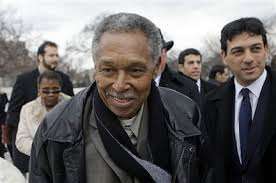Otis McDonald, R.I.P. (The Man Who Got the Second Amendment Applied to States and Localities)
Otis McDonald, the American hero who showed physical, emotional, and political braveness in his role as lead plaintiff in the groundbreaking 2010 Supreme Court case McDonald v. Chicago had died at age 80, as reported by his hometown paper the Chicago Tribune.

McDonald saw his Chicago neighborhood plummeting in quality of life, the very safety of himself and his neighbors sometimes threatened by people who showed little respect for other people's life or safety.
He thought it was unjust that his city essentially barred him and his neighbors from owning the most common tool of self-protection, the handgun.
In the wake of the 2008 Heller decision (which I wrote a book about, Gun Control on Trial), which prohibited the federal government from violating our Second Amendment right to own commonly used weapons for self-defense in the home, Mr. McDonald became lead plaintiff in a case that went to the Supreme Court in 2010, challenging the city of Chicago's ban on handgun ownership.
McDonald won and the right to self-defense in the home via the Second Amendment was applied to the states and localities via the 14th Amendment.
I wrote about McDonald and his case for Reason back in our October 2010 issue in a cover story called "You've Come a Long Way, Baby":
From that story, summing up McDonald's struggle, and his character:
The lead plaintiff, Otis McDonald, is a 76-year-old father of eight and grandfather of more than he can count; he rose from a maintenance engineer at the University of Chicago to head of his union local. McDonald had been embattled by drug dealers, suffering five break-ins in the Chicago home he shares with his wife. "I had a troubled neighborhood," McDonald says. "I was pissed off about the way these kids that had grown up playing basketball in my backyard" had become a threatening gang. When you drive down his street, he says, "you don't get by unless they let you get by." He would see kids he'd known since they were 3 running down his alley, shooting at cars.
"I helped as much as I could help with their parents," McDonald says, "until they told me they didn't want to hear from me anymore in regards to them. I was just fed up. I had to find somebody, some organization, something with the resources and power, and then I knew that I could couple that with myself, with guts and the nerve to do what needed to be done." McDonald started attending gun rights rallies down in Springfield. "I learned a lot about this Washington, D.C., case," he says, "and that's what made me know the Lord was guiding me. I just felt so sure they were going to win the case." A friend McDonald met at a gun rally told Gura about him. When Gura needed clients, the two met and took to each other instantly…..McDonald recalls telling Gura: "Are you willing to go all the way? Then I'm your man, with the name and all. Furthermore, we are going to win."….
And as I wrote about my first occasion interviewing McDonald, the day his case was heard before the Court in March 2010:
Let me tell you something else about Otis McDonald: If you are lucky enough to meet the guy, you're going to love him. Really. In about a half hour of conversation, both one-on-one and in a small group, the guy was devastatingly charming, in a completely unstudied way. He's compelling and convincing and real, telling quotidian stories about being late for planes and late-night fishing; and equally so when getting historical and cosmic about the arc of his life and the role he knows he's playing in his country's history. One minute laughing and light, the other giving a sincerely tear-jerking account of the pride and gratitude he feels toward everyone else, especially the younger generation, advancing the scholarship and advocacy of his and his fellow Americans' rights. After that half hour, I was on this guy's side, just as a fellow human being. And a dream client for a civil rights case like this to boot, as the lawyers present agreed enthusiastically.
That the city of Chicago prevents this man from making the best choice available to him to protect himself and his family from the very real threats that surround him is, simply and with no constitutional history or theory required, wrong…..McDonald, his fellow plaintiffs, and the rest of Chicago will because of his efforts be able to exercise a core human right unmolested. That is great news…
It remains great news, and a great accomplishment from a great American, alas now passed.
